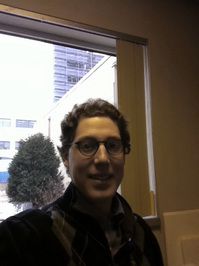 “From the time I was three,” Andy Cook says, “my ambition was to be an NHL goalie.”
“From the time I was three,” Andy Cook says, “my ambition was to be an NHL goalie.”
Cook isn’t going to to be an NHL goalie, which might be the best thing that ever happened to a lot of other people. Today, he did something more courageous than standing in front of a black piece of rubber heading for him at more than 100 mph: He told his story about the mental illness that derailed his career, even though he’s not entirely sure how it’ll be received. It has a message he wants others to hear.
His career track was on schedule after high school when he was named starting goalie as a freshman at Colby College in Maine. Suddenly, one January day, he was virtually unable to leave his dorm room, and he wasn’t sure why. His goalie play suffered.
“I thought maybe I was homesick so I left and transferred to St. John’s to be closer to home,” he said today. His mind was turning on him but he didn’t consider the possibility of a mental illness. How could it be? He was an athlete and he was a “straight A” student. “I know now that all of these things (anxiety and depression going back to high school days) were connected, but at the time I just figured these are the things were part of being me.”
After one year in Minnesota, he returned to Colby and his hockey coach took him back. His play didn’t improve and in his senior year, he quit hockey. The dream was finished.
He graduated in 2009 with a degree in political science and returned to Minnesota to work in the communications office at the House Republican Caucus. He worked hard, he said, and masked the struggle from colleagues. “I had no hope,” he said. “I couldn’t see how anything could get any better.”
He never contemplated taking his own life, although he acknowledges being in a high-rise office with large glass windows once when “this thought popped into my head that I could jump through the window and that would be it,” he said. “That’s when I knew this was not normal.”
He sought help when “I was walking down a hallway in the State Office Building and this wave hit me and I said, ‘I cannot do this forever.'” He went outside, called his mother, and found a therapist who specialized in athletes.
That’s when he began to understand that people like him can have a mental illness. “Having someone tell me, ‘you’re not going to lose the things about you that you like,’ was really important,” he said. “And I realized this is a physiological illness.”
He was diagnosed with mild depression and an anxiety disorder. The therapy that he initially thought wouldn’t work, worked. Medication followed and has made a difference.
Cook worked up the strength to confront the stigma of mental illness and tell his boss, “and he said ‘all we’re interested in is you getting better,'” he said.
“We think of people who have cancer as being courageous, and they are,” he said. “But the person who is suffering from depression and can’t get out of bed in the morning, but they pull themselves up and they go off to work, they’re courageous, too.”
With plenty of help from others, Cook has pulled himself back. He’s working in the development department at Regions Hospital, competing in triathlons, coaching the goalies on the Cretin Derham girl’s hockey team, volunteering at his hospital’s mental health unit, and also helping in the planning of Region’s mental health facility, which will open in December.
“You can see it rising up as you drive in on I-94,” he said. “It’s a big building and that’s a statement that means a lot.”
He’s also not worrying about the future. “I have no idea what the future will bring,” he says, acknowledging that he often did. “I just want to make the most of it.”
A few weeks ago, Sue Abderholden of the National Alliance on Mental Illness Minnesota spoke to a group where Cook works. “She was giving her presentation on the barriers caused by stigma and what we can do to overcome it,” he said. “And she said we need to tell our stories.”
That’s when Cook decided to “pay it forward for all of the people who helped me” and tell the story of his personal struggle. “You don’t have to be in such an acute condition to go get help. It’s not any different than any other illness.”
And you’ll still have the things about you that you like.
